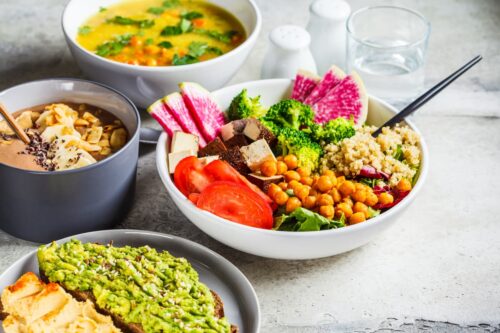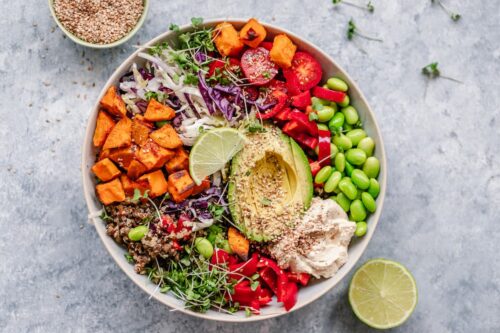High Carb Diet Linked to Breast Cancer: More Deceit
Updated September 18, 2013
Friday’s (August 6, 2004) newspapers worldwide scared some people into believing there is further reason to follow the low-carb diet craze, with headlines like, “High carb diet linked to breast cancer – Study finds Mexican women who ate lots of carbohydrates twice as likely to get disease” (San Francisco Chronicle). According to this newspaper article, these women from Mexico City were getting their main carbohydrates from tortillas, soft drinks, and bread. You might think it is time to change your diet – as far away from what McDougall recommends as possible. Now is not the time for people to make the switch to Atkins or South Beach to save their breasts, but rather now is the time to sort out the undeniable truth.
Confusion has been created – and I believe willfully so by reporters and researchers – by lumping highly processed foods, like sugars and refined flours, and natural carbohydrates, like starches (corn tortillas), vegetables and fruits, together. The only excuse for such obviously irresponsible reporting is that sensational headlines justifying people’s bad habits sell newspapers and flatter the egos of researchers by providing them a moment in the spotlight.
The truth, as mentioned much later in the article, is that the cancer-producing diet is one high in sodas and desserts, and lacking in insoluble fiber from whole grains, fruits and vegetables.
What the Study Actually Says
The study published in the August 2004 issue of the journal Cancer Epidemiology, Biomarkers & Prevention clearly reported more breast cancer in women who ate more calories, protein, total carbohydrates, sucrose, and fructose.1 Sucrose is table sugar and fructose is the primary sugar found in soft drinks (sodas); usually reported as high fructose corn syrup. Eating more fiber and starch (often referred to as complex carbohydrates), both only found in plant foods, meant less breast cancer according to the study.
The explanation for carbohydrates increasing breast cancer rates was that an increase in dietary carbohydrate raises blood sugar and insulin levels. This results in an elevation of Insulin-like Growth Factor-1 (IGF-1), which raises the risk of cancer. IGF-1 does play an important role in cancer, however, research shows this growth-stimulating hormone is increased in our diets primarily by animal proteins,2 and especially those derived from dairy products.3 My guess is these important facts were overlooked because this information did not fit into the authors’ pet theory.
Regardless, what is clear is that the diet of Hispanics in Mexico and the USA has progressively deteriorated over the past 50 years, and as a result, their rates of obesity, type-2 diabetes, heart disease, and cancer of the breast, colon, and prostate have increased as expected.4,5 If you have been to a major city anywhere in Mexico, or Central or South America, like Mexico City, then you know what I am talking about. There is a fast-food restaurant on every corner; the supermarket shelves are lined with greasy corn and potato chips, and other “junk” carbohydrates; and meat and dairy products are coveted by people wanting to share in the American dream.
Women Following the Traditional Mexican Diet Have Much Less Breast Cancer
The truth about the diet of women of Mexican ancestry and breast cancer is summed up in an article from the New York Academy of Science6, “…the age-adjusted rate of breast cancer in countries such as Mexico is among the lowest in the world. In addition, although one of the fastest-growing minority groups in the United States, Hispanic women living in this country have been shown to have the lowest incidence of the mortality rates from this disease across most geographic regions of the United States. Therefore, one might speculate that dietary factors, which have been shown to play a role in breast cancer prevention, may account for this difference. It is well recognized that the traditional Hispanic diet is rich in protective nutrients such as dietary fiber. It is known that through complex mechanisms, dietary fiber works to reduce the amount of estrogens in the body.”
The traditional Mexican diet has been one of corn (tortillas), beans, fruits and vegetables. This kind of eating is associated with very low rates of breast cancer and all other diseases common to people living in Western societies.7 There are many qualities of traditional plant-based foods that prevent diseases, qualities that include their dietary starch, fiber, vitamins, minerals, and other phyto-nutrients. On the other hand, animal-based, and highly-processed, foods encourage cancer growth because they lack these plant-food ingredients and are high in cholesterol, fat, protein, and environmental chemicals.
Breast cancer in Mexico is on the rise, affecting younger women with more frequency for one obvious reason. The younger generations are targeted by, and most easily fall prey to, the marketing efforts of the food industries. Articles like this one that appear in our press serve to confuse people and further compound our worldwide health problems. Newspaper reporters who write this nonsense, and researchers that allow this dishonesty to go on uncorrected, should be ashamed of themselves, and may someday be held accountable for the human suffering caused by twisting the truth.
John McDougall, MD
References
- Isabelle Romieu, Eduardo Lazcano-Ponce, Luisa Maria Sanchez-Zamorano, Walter Willett, and Mauricio Hernandez-Avila Carbohydrates and the Risk of Breast Cancer among Mexican Women Cancer Epidemiol Biomarkers Prev 2004 13: 1283-1289.
- Yu H. Role of the insulin-like growth factor family in cancer development and progression. J Natl Cancer Inst. 2000 Sep 20;92(18):1472-89.
- Holmes MD. Dietary correlates of plasma insulin-like growth factor I and insulin-like growth factor binding protein 3 concentrations. Cancer Epidemiol Biomarkers Prev. 2002 Sep;11(9):852-61.
- Jimenez-Cruz A, Bacardi-Gascon M, Turnbull WH, Rosales-Garay P, Severino-Lugo I. A flexible, low-glycemic index mexican-style diet in overweight and obese subjects with type 2 diabetes improves metabolic parameters during a 6-week treatment period. Diabetes Care. 2003 Jul;26(7):1967-70.
- Rivera JA, Barquera S, Campirano F, Campos I, Safdie M, Tovar V. Epidemiological and nutritional transition in Mexico: rapid increase of non-communicable chronic diseases and obesity. Public Health Nutr. 2002 Feb;5(1A):113-22.
- Jones LA, Gonzalez R, Pillow PC, Gomez-Garza SA, Foreman CJ, Chilton JA, Linares A, Yick J, Badrei M, Hajek RA.. Dietary fiber, Hispanics, and breast cancer risk? Ann N Y Acad Sci. 1997 Dec 26;837:524-36.
- Malin AS, Qi D, Shu XO, Gao YT, Friedmann JM, Jin F, Zheng W. Intake of fruits, vegetables and selected micronutrients in relation to the risk of breast cancer. Int J Cancer. 2003 Jun 20;105(3):413-8.
- Kushi L, Giovannucci E. Dietary fat and cancer. Am J Med. 2002 Dec 30;113 Suppl 9B:63S-70S. Review.
- Romieu I, Hernandez-Avila M, Lazcano-Ponce E, Weber JP, Dewailly E. Breast cancer, lactation history, and serum organochlorines. Am J Epidemiol. 2000 Aug 15;152(4):363-70.
Recommended Articles

When Friends Ask: Where Do You Get Your Calcium?

The Ultimate Diabetic Diet Plan: How to Manage Blood Sugar Through Nutrition






